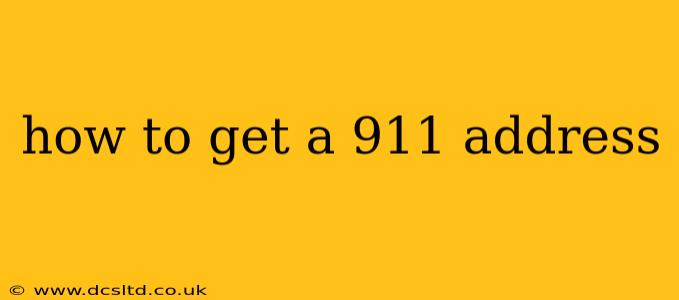How to Get a 911 Address: Ensuring Your Safety and Emergency Response
Getting a properly assigned 911 address is crucial for your safety and the effectiveness of emergency responders. A correctly assigned address ensures that first responders can quickly and accurately locate you in an emergency, saving precious time that could mean the difference between life and death. This process varies depending on your location and whether you live in a traditional addressable area or a more rural setting. Let's break down the steps and address some common questions.
What is a 911 Address and Why is it Important?
A 911 address is the precise location of your home or business that's used by emergency dispatchers to direct first responders. Unlike a mailing address, which might be a PO Box or a general location, a 911 address pinpoints your property on a map, often using GPS coordinates. This accuracy is vital because seconds count in emergency situations. An incorrect or missing address can lead to delays, hindering rescue efforts and potentially endangering lives.
How Do I Know if My Address is Properly Assigned to 911?
The best way to confirm your address is registered correctly is to contact your local Emergency Medical Services (EMS) or your county's 911 dispatch center. They can verify if your address is in their system and accurately mapped. Many counties provide online tools to check your address, so explore your local government's website.
What if My Address is Incorrect or Missing from the 911 System?
If your address is incorrect or missing, you need to take immediate action. This typically involves contacting your local authorities responsible for maintaining 911 address data. This might be your county's GIS (Geographic Information System) department, your local municipality's public works department, or a similar entity. They'll likely guide you through the process of updating your address information. Be prepared to provide:
- Your full address: Include street number, street name, city, state, and zip code.
- Proof of residency: This could be a utility bill, driver's license, or lease agreement.
- Property details: Any additional information that can help locate your property precisely, such as landmarks, access points, or even a GPS coordinate.
What if I Live in a Rural Area Without Traditional Addresses?
For those living in rural areas without established street addresses, acquiring a 911 address requires more effort. You might need to work with your local emergency services or county officials to obtain an address, possibly involving:
- GPS coordinates: Providing accurate GPS coordinates for your property is essential.
- Landmark identification: Describe clearly identifiable landmarks near your property.
- Addressing systems: Your county might have a rural addressing program; inquire about it.
What if I'm Building a New Home?
If you're building a new home, contact your local authorities before construction begins to ensure your address is included in the 911 system. This prevents delays in emergency response after moving in. Proactive communication is key.
How Often Should I Verify My 911 Address?
It's good practice to verify your 911 address periodically, particularly if you've had any changes to your property, like a new driveway or significant landscaping. Annual verification is a reasonable approach.
Can I Get My 911 Address Online?
Unfortunately, there's no single national online database for 911 addresses. You must contact your local authorities – the process is location-specific.
By taking proactive steps to ensure your 911 address is accurate and up-to-date, you significantly enhance the safety and security of yourself and your family. Don't hesitate to reach out to your local emergency services or relevant government agencies – your safety is their priority.
